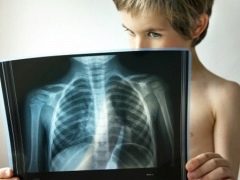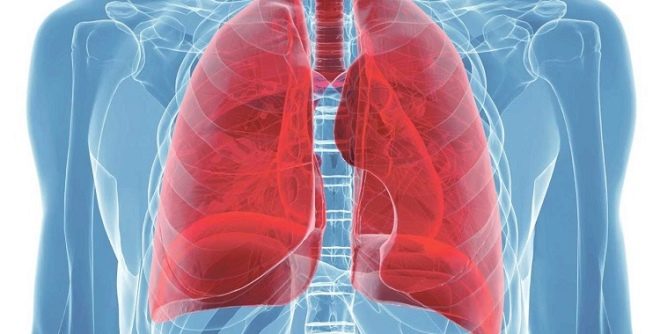Psychosomatics of lung problems in children and adults
Lung problems affect all age groups equally. Pneumonia and tuberculosis are quite widespread. Doctors are sounding the alarm - because the growth of pulmonary diseases is rapid. Not always problems with the lungs are directly related to viruses or bacteria. Sometimes the reason lies in the psychology of the person. It is this connection that psychosomatics studies. On the psychosomatic prerequisites for the development of diseases of the lungs and will be discussed in this material.
Total information
The lungs are a paired organ of the respiratory system. Their main function is gas exchange. Into the lungs, the air that is warmed and moistened in the airways from the outside enters, and they give back to the outside the spent carbon dioxide. But not everyone knows that, in addition to this function, the lungs also perform many important and useful things for our livelihoods:
- they change the acidity of the blood;
- act as a shock absorber of our heart, protecting it from possible external shocks;
- produce immunoglobulin A and some active antimicrobial compounds in bronchial mucus, helping the body to resist respiratory diseases;
- provide the necessary speed of a stream of air in order that the voice was sonorous;
- lungs - a kind of blood reservoir (9% of all blood is contained here);
- are active participants in thermoregulation.
Pulmonary diseases can be caused by fungi (actinomycosis), viruses (viral pneumonia), and bacteria (tuberculosis). Inflammation of the lungs and tuberculosis are the most common lesions. There may be parasitic diseases that are caused by certain parasites, there may be malignant tumors. Inflammatory diseases of sarcoidosis are widespread.
Injury and damage to the lung structure can cause hemothorax and pneumothorax. Bronchial asthma is widespread among children and adults.
How to understand that a psychosomatic illness?
In case of problems with breathing, it is first of all important to exclude infectious and physiological causes. To do this, it is necessary to be examined - to be tested, to make a radiograph of the lungs in two projections, sometimes the answer to the question of why the disease appeared, gives an MRI or CT scan. Psychosomatic causes of lung disease can be suspected if the examination does not detect abnormalities, trauma, inflammation or other signs of illness, and there is a problem with breathing.
And also a situation can say about the influence of psychogenic factors when the prescribed treatment does not produce the desired effect, it does not become better for the person. Frequent exacerbations of lung diseases, chronic diseases also in most cases, in addition to the main one, have a psychosomatic cause or are completely psychogenic.
Psychogenic causes
The lungs provide breathing. They take oxygen, which is necessary for the work of the whole organism, for life, they give away unnecessary carbon dioxide, and so constantly, even in sleep. The lungs do the same at the metaphysical level. Lung diseases develop when a person has an impaired exchange with the outside world - he does not inhale or not fully inhale life, information, fresh ideas, does not completely give up everything that has been spent and unnecessary (old thoughts, emotions that have already outlived theirs).
If a person tries to inhale as much as possible, he develops hyperventilation, if he restricts the amount of incoming information, bans himself to live and breathe fully, he develops respiratory failure, and in this the psychology of lung diseases is quite simple and understandable to everyone.
Lung disease develops in those who voluntarily limit contact with the world. There are a large number of people (children and adults) who do not allow themselves to take deep breaths - they are very important, very pleased with themselves, who believe that the world around them is clearly not worthy. Their breasts are “wheel”, the lungs in the expanded chest are not working at full capacity, their breaths are superficial. The higher up the career ladder or in personal achievements such a person rises, the more insignificant and miserable to him are everyone who lives “outside” - that is, everyone else except him. Psychotherapists and psychoanalysts argue that adults with this psychotype are often snobs and arrogant, and almost everyone has problems with their lungs.
The second type of lung disease is people with ossified, old thinking, reinforced concrete norms, dogmas and rules that are not subject to any changes. It is almost impossible to explain something to such people, to convince them of the benefits of innovations, new laws, new scientific discoveries. They are only sure that they have long known themselves.
The third category of adults with lung diseases are those who live high and important ideals for them. Such people often talk about the principles of justice, equality and fraternity, talk about ideality and ideals, but in practice they constantly face the harsh reality that is completely different from their ideals. For some time they have been struggling to fit the world into the volume of their own ideas about it (in fact, to the volume of their lungs), but the world either pitches in this large space, or flatly refuses to fit there, stuck halfway through.
In all three cases, the disease does not begin on its own, but only when a person begins to reject the world as indecent, not suitable for him. Furious beginnings begin to shun the world, trying to create their own, where everything will be luxurious, beautiful, without queues and the smell of sweat in public transport. Conservatives (the second type) reject the world in principle, since they do not want to accept its new trends. Idealists either suffer silently from resentment and frustration and burn for tuberculosis in a matter of months, or begin to actively fight to “destroy the old world to the ground, and then build a new one on its ruins,” that is, they embark on the path of revolutionaries and begin to suffer from pneumonia, bronchitis and lung cancer. In 1917, in Russia, when revolutionary sentiment spread to a significant part of the country's population, consumption (tuberculosis), as well as pneumonia, came out on top because of the death rate of people.
Dreamer and idealist to be difficult in our time. Imagine the situation that a person suddenly became interested in religion. He believes, and immediately begins to want everyone around to believe in what is close to him now. He begins to impose faith among loved ones and friends, but very often he faces complete bewilderment and incomprehension. Disappointment causes anger, which is thoroughly suppressed (so as not to be considered fanatic), which leads to an inflammatory process in the lung tissue or respiratory membrane.
Thus, a negative attitude towards the world around and attempts to avoid it or change it (not itself, but the world), with a high degree of probability, cause a variety of pulmonary problems.
In childhood
The causes of lung diseases in children have their own specific differences from adults. Much will be similar, but still specific. If a child is sick, then it is worth considering which of the following reasons could have occurred.
- Adults do not give the child to fantasize. All children love to imagine, invent and write, but not all parents support it. They often pull up the baby, they demand to stop inventing, they force to live only reality, in which there is a place for money, work, kindergarten, activities, but there is no place for fairies and warriors, trolls and dragons. This attitude offends the child. Makes him close his inner world from the outside, in which stale adults do not understand anything in dragons. So the child limits the amount of inhaled air, his lungs stop working at full capacity.
- Adults have not taught the child the right attitude to money and material benefits. Such situations concern spoiled children, growing up in very wealthy families, not needing money and toys, and by their 6-7 years no longer knowing what else to dream of - everything is already there. They have pulmonary pathologies that develop according to the type of self-satisfied adults described above. At some point, the child understands that he is above all his other contemporaries, since material benefits give him the right to a “special position”. They are small snobs and big posers. It becomes unpleasant for them to breathe the same air with mere mortals.
- Parents suppress child custody. For this reason, pulmonary pathologies most often develop in the youngest patients - children under 3 years old. If, from birth, the child is not allowed to step without control and care from his grandmother, grandfather, mother and father, if he is “stifled” with his excessive love and anxiety, then it is impossible to breathe deeply with a couple of adults and take a breath breastfeeding Will not work.
- Parents sat the child on the throne. Often parents complain about pulmonary problems in a child who gave birth to him at a respectable age, sometimes with the help of IVF, treasured and trembling over their baby. From the first days they appointed him to reign, he is the head of the family. All obey the will of the child, all give up and run to fulfill his wishes and orders. The world for such a child is no more than half the kingdom, which can be presented in a good mood. He is his own world. It is here that a violation of exchange with the real world develops, this or that respiratory disease starts.
Detection and elimination of the underlying cause in adults and children usually restores lung function.

















